八上 Unit 1 Where did you go on vacation?Section A (GF-3C)课件(共29张PPT)
文档属性
| 名称 | 八上 Unit 1 Where did you go on vacation?Section A (GF-3C)课件(共29张PPT) | 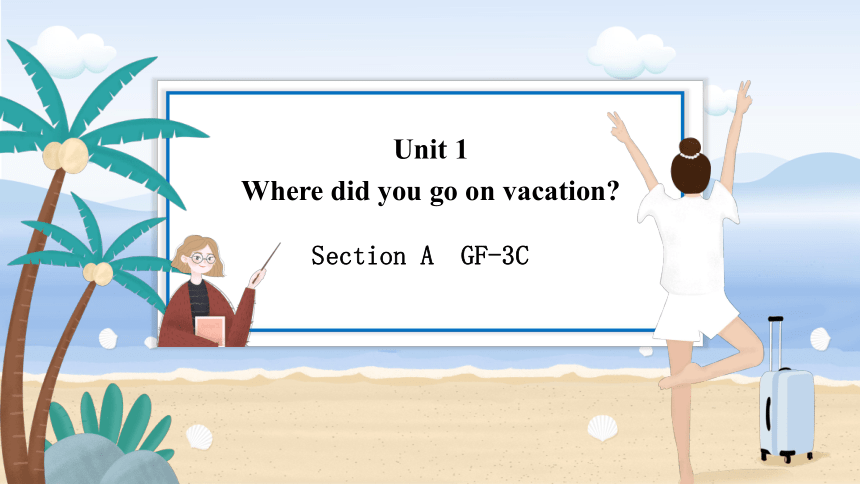 | |
| 格式 | pptx | ||
| 文件大小 | 19.7MB | ||
| 资源类型 | 教案 | ||
| 版本资源 | 人教新目标(Go for it)版 | ||
| 科目 | 英语 | ||
| 更新时间 | 2023-09-03 12:49:27 | ||
图片预览

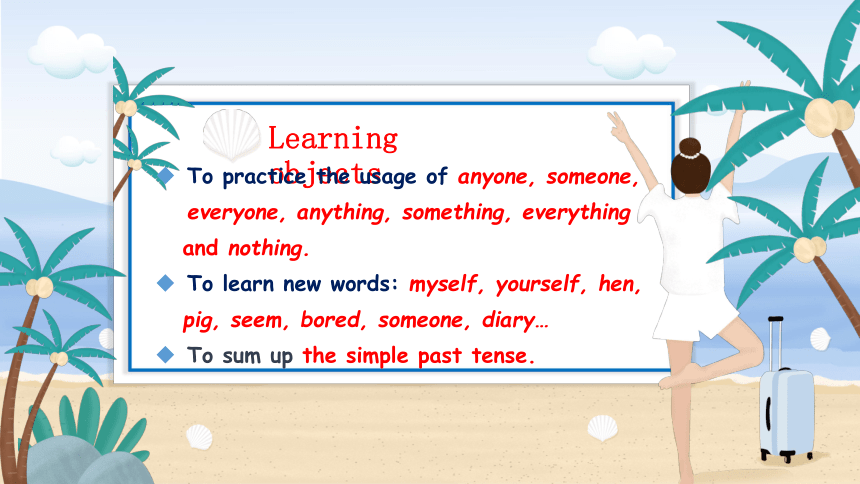
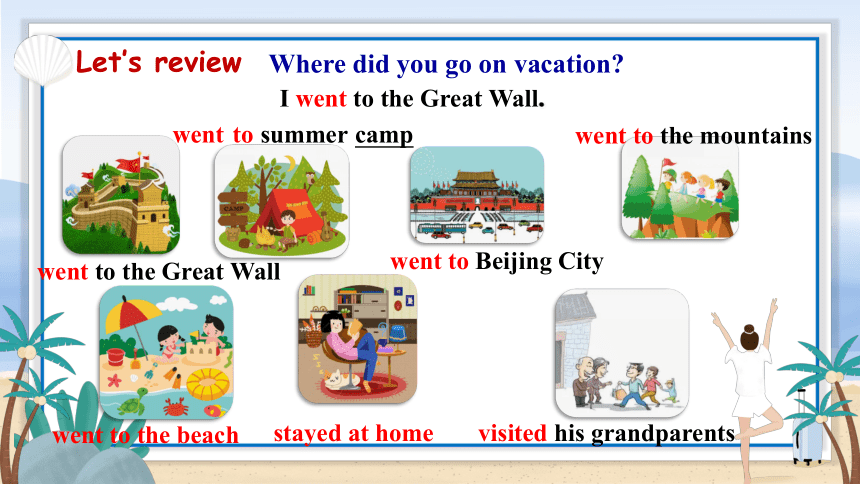
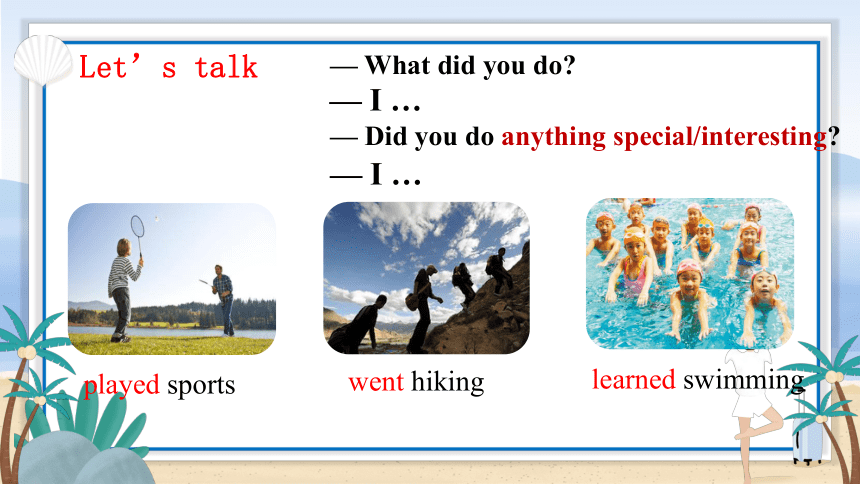
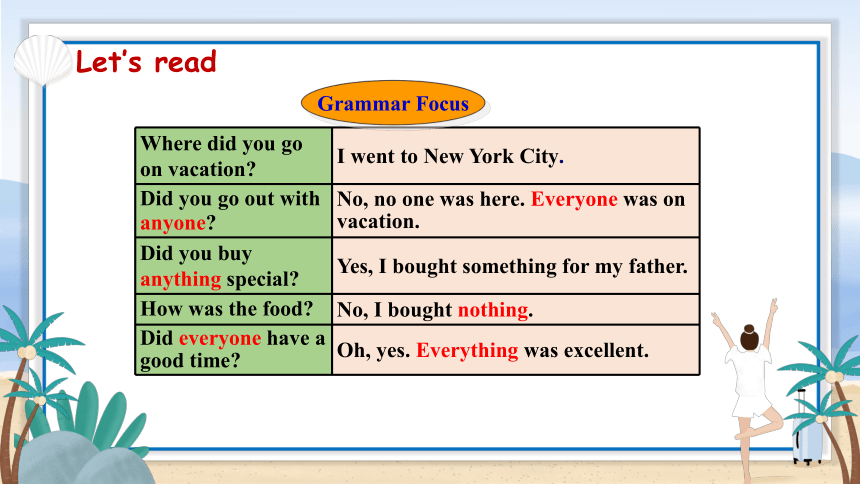
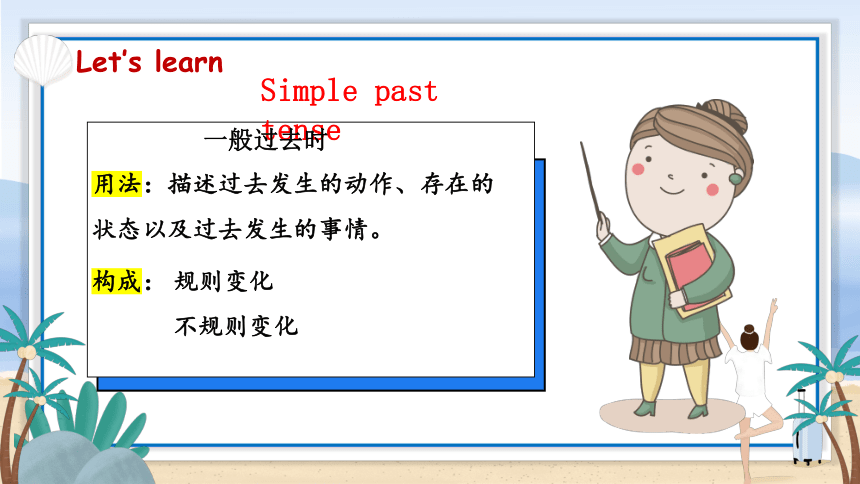
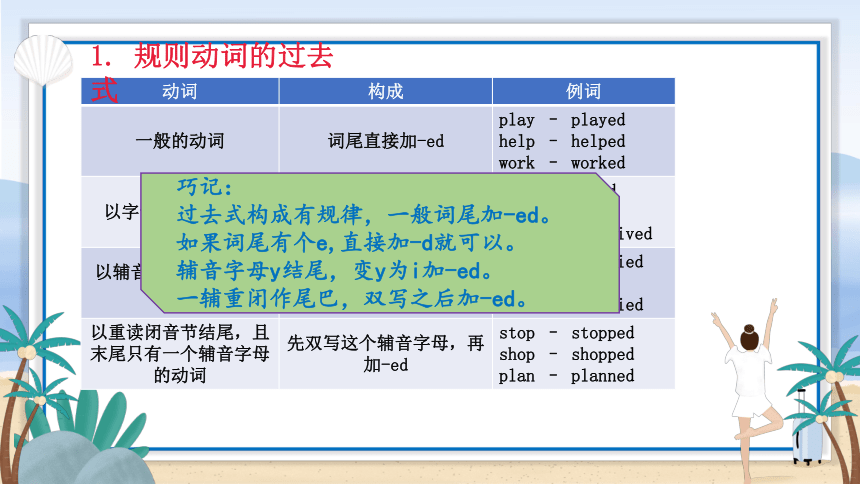
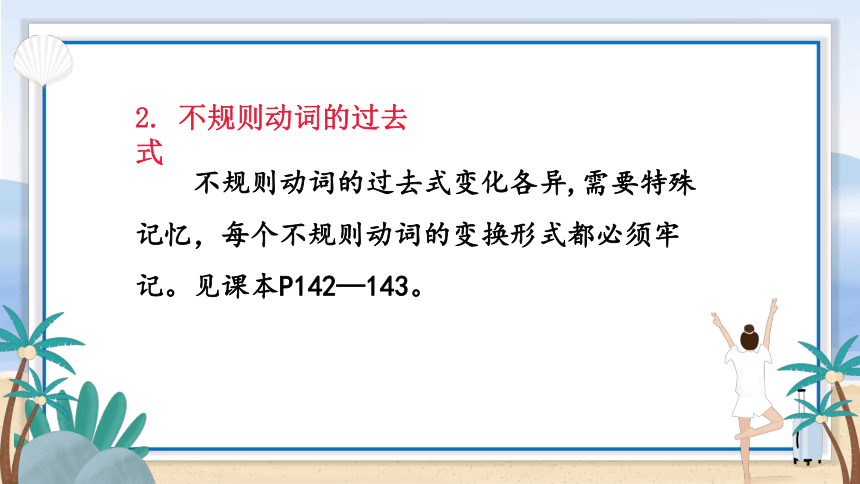
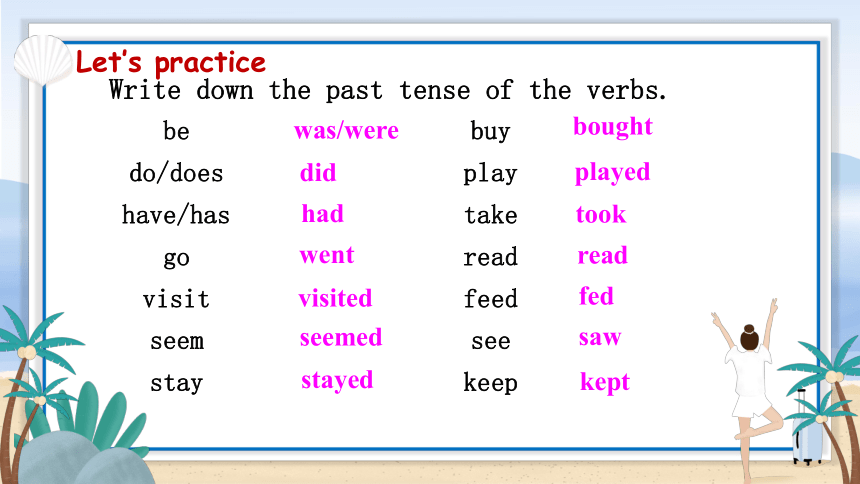
文档简介
(共29张PPT)
Unit 1
Where did you go on vacation
Section A GF-3C
Learning objects
To practice the usage of anyone, someone, everyone, anything, something, everything
and nothing.
To learn new words: myself, yourself, hen,
pig, seem, bored, someone, diary…
To sum up the simple past tense.
Let’s review
Where did you go on vacation
I went to the Great Wall.
visited his grandparents
stayed at home
went to the beach
went to the mountains
went to Beijing City
went to summer camp
went to the Great Wall
Let’s talk
— What did you do
— I …
played sports
went hiking
learned swimming
— Did you do anything special/interesting
— I …
Where did you go on vacation I went to New York City.
Did you go out with anyone No, no one was here. Everyone was on vacation.
Did you buy anything special Yes, I bought something for my father.
How was the food No, I bought nothing.
Did everyone have a good time Oh, yes. Everything was excellent.
Grammar Focus
Let’s read
Simple past tense
一般过去时
用法:描述过去发生的动作、存在的
状态以及过去发生的事情。
构成: 规则变化
不规则变化
Let’s learn
动词 构成 例词
一般的动词 词尾直接加-ed play – played
help – helped
work – worked
以字母e结尾的动词 词尾只加-d like – liked
live – lived
arrive – arrived
以辅音字母加y结尾的动词 变y为i,再加-ed study – studied
cry – cried
worry – worried
以重读闭音节结尾,且末尾只有一个辅音字母的动词 先双写这个辅音字母,再加-ed stop – stopped
shop – shopped
plan – planned
1. 规则动词的过去式
巧记:
过去式构成有规律,一般词尾加-ed。
如果词尾有个e,直接加-d就可以。
辅音字母y结尾,变y为i加-ed。
一辅重闭作尾巴,双写之后加-ed。
不规则动词的过去式变化各异,需要特殊记忆,每个不规则动词的变换形式都必须牢记。见课本P142—143。
2. 不规则动词的过去式
Write down the past tense of the verbs.
be
do/does
have/has
go
visit
seem
stay
was/were
went
did
had
visited
seemed
stayed
buy
play
take
read
feed
see
keep
bought
read
played
took
fed
saw
kept
Let’s practice
Practice
A:How your vacation, Lin
B: It pretty good.
A: How the beaches
B: They great.
A: How the weather
B: It hot and wet.
A: How the people
B: They unfriendly.
A:How the stores
B: They expensive.
was
was
were
were
was
was
were
were
were
were
Be— am/is(was)
are(were)
Be 填空
复合不定代词
1.定义:由some, any, no, every分别加上-one, -body, -thing构成的不定代词叫做合成不定代词或复合不定代词。
2.常见的复合不定代词
3. 用法
Let’s learn
复合不定代词小结:
某人 某事
任何人 任何事
没有人 没有东西
每人 一切
someone
anyone
no one
everyone
somebody
anybody
nobody
everybody
something
anything
nothing
everything
1. some, any, no, every与-one, -thing ,-body可以组成复合不定代词,他们分别是:
2. 复合不定代词用法
(1) some系列的不定代词和some一样主要用于肯定句;
any系列的不定代词和any一样主要用于否定或疑问句。如:
There is ___________ wrong with my bike.
我的自行车出毛病了。
I can’t see _______in the classroom.
在教室里我没看见任何人。
something
anyone
不过,在表示请求、建议或征求意见的疑问句中常用some
系列的词。
eg. Would you like ___________to drink
你想要一些喝的东西吗?
在表达“任何”这一含义的肯定句中也要用any系列的词。
eg. I think__________ can do it.
我认为任何人都会做。
anyone
something
(2) 修饰复合不定代词something, anyone等的adj , adv, to do不定式等要放在不定代词的后面。如:
Did you meet __________________
你遇见有趣的人了吗?
I have ________ to do today.
我今天没什么事可做。
There’s __________________ in the newspaper today.
今天的报纸里有一些重要的内容。
anyone interesting
nothing
something important
(4) no 系列的不定代词可与not...any 系列的不定代词替换。
eg. I bought nothing.= I______ buy ___________.
我什么也没买。
didn't
anything
(3)这些不定代词作主语时看作单数,谓语动词用单数形式。
eg. Everyone ______ on vacation last weekend.
上周末所有的人都在度假。
was
Practice
1. He didn’t do ________ interesting last Sunday.
He just stayed at home and watched TV.
2. — Look! ________ is dancing under the tree.
— Oh, that’s my cousin Anna.
3. __________ in the store is expensive. I don’t
want to buy anything.
一、用方框中所给单词的适当形式填空。
anyone anything everything someone everyone
anything
Someone
Everything
Practice
一、用方框中所给单词的适当形式填空。
anyone anything everything someone everyone
4. The singer is very famous. _________ here
knows her.
5. — Did you talk with ______ on the phone
— Yes, it was Linda.
Everyone
anyone
Language points
myself (我自己) ,yourself (你自己)是反身代词。表示“某人自己的词”叫反身代词。见下表:
myself yourself himself herself itself
我自己 你自己 他自己 她自己 它自己
ourselves yourselves themselves
我们自己 你们自己 他们自己
反身代词小结:
1) Did you buy anything for yourself
你为你自己买什么东西了吗 (做介词宾语)
2) The old man taught himself English.
那位老人自学英语。(做动词宾语)
3) The thing itself is not important.
事情本身并不重要。(做同位语)
4) I myself visited my aunt last weekend.
上周我自己去拜访了姑姑。(做同位语)
(注意:反身代词不能单独做主语)
3a
Fill in the blanks with the words in the box and practice the conversation.
anyone something anything everything nothing
Linda: Did you do___________ fun on your vacation, Alice
Alice: Yes, I did. I went to Sanya.
Linda: How did you like it
Alice: Well, it was my first time there, so___________
was really interesting.
anything
everything
你认为它怎么样?
Let’s practice
Linda: Did you go with__________
Alice: Yes, I did. I went with my sister.
Linda: Did you go shopping
Alice: Of course! I bought__________ for my parents, but _________for myself.
Linda: Why didn’t you buy__________ for yourself
Alice: I didn’t really see ____________I liked.
anyone
something
nothing
anything
anything
我自己
你自己
Fill in the blanks in the e-mail message with the words in the box.
3b
anything everything nothing everyone no one
Dear Bill,
How was your vacation Did you do ________ interesting Did________ in the family go with you I went to a friend’s farm in the countryside with my family. __________was great.
anything
everyone
Everything
We fed some hens and saw some baby pigs. They were so cute! The only problem was that there was __________ much to do in the evening but read. Still __________ seemed to be bored. Bye for now!
Mark
nothing
no one
feed v. 喂养
除了
似乎
Let’s practice
3c
Ask your group questions about their last vacation. Then tell the class your results.
Did you… Everyone Someone (write the classmates’name ) No one
eat anything at a restaurant
read anything interesting
visit anyone in your family
buy anything
keep a diary
Report :In our group, everyone ate something at a restaurant. No one read anything interesting. Li Lei visited his grandparents in the town. Liu Xue bought something interesting. Xu Li kept a diary.
Let’s do a report
用所给动词的适当形式填空。
We ______ (live) in Japan last year.
Jack________ (stop) the car last Sunday.
Tom _______ (clean) his room and ________ (study) for the Chinese test last weekend.
4.What ______ you ______(do) last night
5.On Sunday morning I _______ (play) tennis.
lived
stopped
cleaned
studied
did
do
played
Exercises
中考链接
Learning is a lifelong journey because we can learn _______ every day.
A. nothing new
B. new something
C. something new
“每天学习新的东西”,肯定句用something,修饰语放在不定代词后面。
C
Summary
复合不定代词的用法。
运用一般过去时态的各种句式来谈论自己 或别人的假期活动。
自己总结并归纳复合不定代词的用法和一般过去时态的各种句式。
Homework
1. Write about your vacation in your
exercise book.
2. Preview the next part.
Thank you!
Unit 1
Where did you go on vacation
Section A GF-3C
Learning objects
To practice the usage of anyone, someone, everyone, anything, something, everything
and nothing.
To learn new words: myself, yourself, hen,
pig, seem, bored, someone, diary…
To sum up the simple past tense.
Let’s review
Where did you go on vacation
I went to the Great Wall.
visited his grandparents
stayed at home
went to the beach
went to the mountains
went to Beijing City
went to summer camp
went to the Great Wall
Let’s talk
— What did you do
— I …
played sports
went hiking
learned swimming
— Did you do anything special/interesting
— I …
Where did you go on vacation I went to New York City.
Did you go out with anyone No, no one was here. Everyone was on vacation.
Did you buy anything special Yes, I bought something for my father.
How was the food No, I bought nothing.
Did everyone have a good time Oh, yes. Everything was excellent.
Grammar Focus
Let’s read
Simple past tense
一般过去时
用法:描述过去发生的动作、存在的
状态以及过去发生的事情。
构成: 规则变化
不规则变化
Let’s learn
动词 构成 例词
一般的动词 词尾直接加-ed play – played
help – helped
work – worked
以字母e结尾的动词 词尾只加-d like – liked
live – lived
arrive – arrived
以辅音字母加y结尾的动词 变y为i,再加-ed study – studied
cry – cried
worry – worried
以重读闭音节结尾,且末尾只有一个辅音字母的动词 先双写这个辅音字母,再加-ed stop – stopped
shop – shopped
plan – planned
1. 规则动词的过去式
巧记:
过去式构成有规律,一般词尾加-ed。
如果词尾有个e,直接加-d就可以。
辅音字母y结尾,变y为i加-ed。
一辅重闭作尾巴,双写之后加-ed。
不规则动词的过去式变化各异,需要特殊记忆,每个不规则动词的变换形式都必须牢记。见课本P142—143。
2. 不规则动词的过去式
Write down the past tense of the verbs.
be
do/does
have/has
go
visit
seem
stay
was/were
went
did
had
visited
seemed
stayed
buy
play
take
read
feed
see
keep
bought
read
played
took
fed
saw
kept
Let’s practice
Practice
A:How your vacation, Lin
B: It pretty good.
A: How the beaches
B: They great.
A: How the weather
B: It hot and wet.
A: How the people
B: They unfriendly.
A:How the stores
B: They expensive.
was
was
were
were
was
was
were
were
were
were
Be— am/is(was)
are(were)
Be 填空
复合不定代词
1.定义:由some, any, no, every分别加上-one, -body, -thing构成的不定代词叫做合成不定代词或复合不定代词。
2.常见的复合不定代词
3. 用法
Let’s learn
复合不定代词小结:
某人 某事
任何人 任何事
没有人 没有东西
每人 一切
someone
anyone
no one
everyone
somebody
anybody
nobody
everybody
something
anything
nothing
everything
1. some, any, no, every与-one, -thing ,-body可以组成复合不定代词,他们分别是:
2. 复合不定代词用法
(1) some系列的不定代词和some一样主要用于肯定句;
any系列的不定代词和any一样主要用于否定或疑问句。如:
There is ___________ wrong with my bike.
我的自行车出毛病了。
I can’t see _______in the classroom.
在教室里我没看见任何人。
something
anyone
不过,在表示请求、建议或征求意见的疑问句中常用some
系列的词。
eg. Would you like ___________to drink
你想要一些喝的东西吗?
在表达“任何”这一含义的肯定句中也要用any系列的词。
eg. I think__________ can do it.
我认为任何人都会做。
anyone
something
(2) 修饰复合不定代词something, anyone等的adj , adv, to do不定式等要放在不定代词的后面。如:
Did you meet __________________
你遇见有趣的人了吗?
I have ________ to do today.
我今天没什么事可做。
There’s __________________ in the newspaper today.
今天的报纸里有一些重要的内容。
anyone interesting
nothing
something important
(4) no 系列的不定代词可与not...any 系列的不定代词替换。
eg. I bought nothing.= I______ buy ___________.
我什么也没买。
didn't
anything
(3)这些不定代词作主语时看作单数,谓语动词用单数形式。
eg. Everyone ______ on vacation last weekend.
上周末所有的人都在度假。
was
Practice
1. He didn’t do ________ interesting last Sunday.
He just stayed at home and watched TV.
2. — Look! ________ is dancing under the tree.
— Oh, that’s my cousin Anna.
3. __________ in the store is expensive. I don’t
want to buy anything.
一、用方框中所给单词的适当形式填空。
anyone anything everything someone everyone
anything
Someone
Everything
Practice
一、用方框中所给单词的适当形式填空。
anyone anything everything someone everyone
4. The singer is very famous. _________ here
knows her.
5. — Did you talk with ______ on the phone
— Yes, it was Linda.
Everyone
anyone
Language points
myself (我自己) ,yourself (你自己)是反身代词。表示“某人自己的词”叫反身代词。见下表:
myself yourself himself herself itself
我自己 你自己 他自己 她自己 它自己
ourselves yourselves themselves
我们自己 你们自己 他们自己
反身代词小结:
1) Did you buy anything for yourself
你为你自己买什么东西了吗 (做介词宾语)
2) The old man taught himself English.
那位老人自学英语。(做动词宾语)
3) The thing itself is not important.
事情本身并不重要。(做同位语)
4) I myself visited my aunt last weekend.
上周我自己去拜访了姑姑。(做同位语)
(注意:反身代词不能单独做主语)
3a
Fill in the blanks with the words in the box and practice the conversation.
anyone something anything everything nothing
Linda: Did you do___________ fun on your vacation, Alice
Alice: Yes, I did. I went to Sanya.
Linda: How did you like it
Alice: Well, it was my first time there, so___________
was really interesting.
anything
everything
你认为它怎么样?
Let’s practice
Linda: Did you go with__________
Alice: Yes, I did. I went with my sister.
Linda: Did you go shopping
Alice: Of course! I bought__________ for my parents, but _________for myself.
Linda: Why didn’t you buy__________ for yourself
Alice: I didn’t really see ____________I liked.
anyone
something
nothing
anything
anything
我自己
你自己
Fill in the blanks in the e-mail message with the words in the box.
3b
anything everything nothing everyone no one
Dear Bill,
How was your vacation Did you do ________ interesting Did________ in the family go with you I went to a friend’s farm in the countryside with my family. __________was great.
anything
everyone
Everything
We fed some hens and saw some baby pigs. They were so cute! The only problem was that there was __________ much to do in the evening but read. Still __________ seemed to be bored. Bye for now!
Mark
nothing
no one
feed v. 喂养
除了
似乎
Let’s practice
3c
Ask your group questions about their last vacation. Then tell the class your results.
Did you… Everyone Someone (write the classmates’name ) No one
eat anything at a restaurant
read anything interesting
visit anyone in your family
buy anything
keep a diary
Report :In our group, everyone ate something at a restaurant. No one read anything interesting. Li Lei visited his grandparents in the town. Liu Xue bought something interesting. Xu Li kept a diary.
Let’s do a report
用所给动词的适当形式填空。
We ______ (live) in Japan last year.
Jack________ (stop) the car last Sunday.
Tom _______ (clean) his room and ________ (study) for the Chinese test last weekend.
4.What ______ you ______(do) last night
5.On Sunday morning I _______ (play) tennis.
lived
stopped
cleaned
studied
did
do
played
Exercises
中考链接
Learning is a lifelong journey because we can learn _______ every day.
A. nothing new
B. new something
C. something new
“每天学习新的东西”,肯定句用something,修饰语放在不定代词后面。
C
Summary
复合不定代词的用法。
运用一般过去时态的各种句式来谈论自己 或别人的假期活动。
自己总结并归纳复合不定代词的用法和一般过去时态的各种句式。
Homework
1. Write about your vacation in your
exercise book.
2. Preview the next part.
Thank you!
同课章节目录
- Unit 1 Where did you go on vacation?
- Section A
- Section B
- Unit 2 How often do you exercise?
- Section A
- Section B
- Unit 3 I'm more outgoing than my sister.
- Section A
- Section B
- Unit 4 What's the best movie theater?
- Section A
- Section B
- Unit 5 Do you want to watch a game show?
- Section A
- Section B
- Unit 6 I'm going to study computer science.
- Section A
- Section B
- Unit 7 Will people have robots?
- Section A
- Section B
- Unit 8 How do you make a banana milk shake?
- Section A
- Section B
- Unit 9 Can you come to my party?
- Section A
- Section B
- Unit 10 If you go to the party, you'll have a grea
- Section A
- Section B
